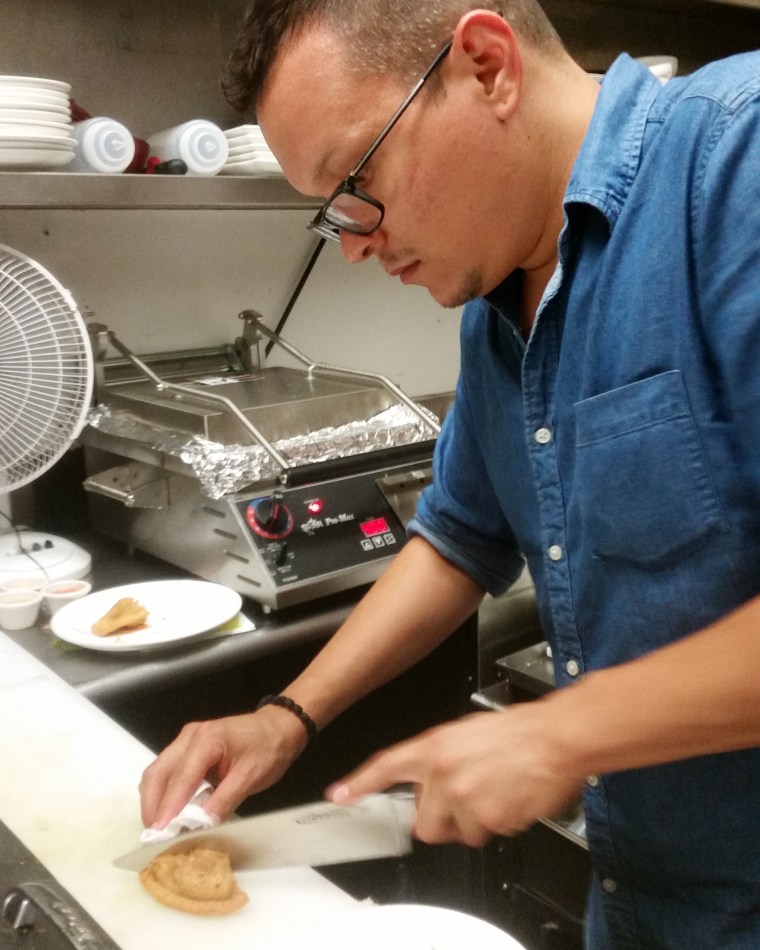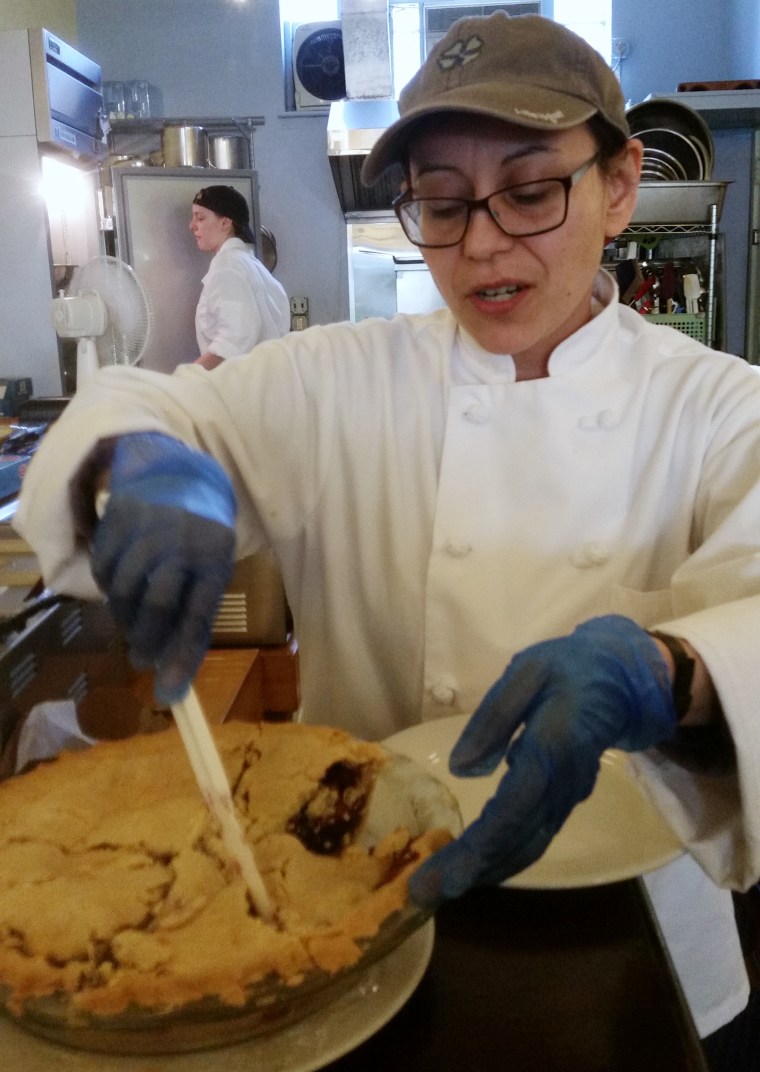NEW YORK, NY -- Radha Ugo, 30, has never eaten meat in his life and never will.
Ugo, a Manhattan resident who was born in Peru to an Argentinian father and a Uruguayan mother, said his parents had already embraced a vegetarian lifestyle before he was born.
“I do my best not to cause harm and suffering to other living creatures,” Ugo said. “When it’s in front of your plate and put in a cute sandwich with cheese and lettuce, it looks harmless. … But this animal died so it could sit in your sandwich. I could never live with myself knowing that I was ok with eating a dead animal," he said. "There is no one dish that’s made with meat that cannot be made vegetarian. Thankfully in New York City, you have five-star restaurants that are strictly vegetarian. That’s unheard of in most places.”
Ugo is among the 5 percent of adults in the United States who identify as vegetarian. According to a 2012 Gallup poll, an even smaller subset of Americans – 2 percent – follow a vegan diet, opting for plant-based proteins and forgoing animal products, including eggs and dairy. However, there are more food options for Latinos who are eschewing meat. Some blogs and articles are dedicated to revising traditional Latin recipes to make them vegetarian friendly. Others are opening restaurants to cater to meat-free patrons.

Just a few subway stops from Ugo’s apartment in Manhattan's Upper East Side, Daniel and Alex Carabaño serve vegan organic meals with Latin flavor in the East Village.
The brothers, who are of Colombian descent, opened The V Spot in Brooklyn nearly a decade ago. They opened VSpot Organic in Manhattan’s East Village this summer. Alex, who is in his early 30s, is a vegetarian (he still enjoys eating cheese occasionally). Daniel, 37, has been a vegan for 12 years. He was working as a math teacher at Brooklyn Technical High School but quit his job to start his first vegan restaurant in the borough’s Park Slope neighborhood in 2006.
The menus are influenced not just by their Colombian background but by their upbringing in Brooklyn: and patrons can find Italian, Mexican and other food options, the brothers said. One of the more popular items at their new Manhattan location is the Philly style empanada with sautéed mushrooms, peppers, onions, cashew cheese and seitan – a wheat protein alternative to meat. Another dish features seitan as a meat substitute for carne molida – usually ground meat that is finely chopped.

“There’s a certain stigma in the Latin community that to say no to meat would seem ignorant. … But culture is in the heart, nothing can take that away. You don’t lose your salsa rhythm because you had tofu,” Daniel Carabaño said. Since meat was a staple at every meal, it was initially difficult for Dr. Glennis Rodriguez’s Dominican family to adjust to her new diet. Rodriguez, 31, an internal medicine doctor who grew up in West New York, N.J., said she became a vegan in 2009 and re-introduced fish to her diet two years later. She still maintains a partial vegetarian diet. “It was especially difficult for my mother to cook a meal for me because she is accustomed to making everything- including vegetable dishes like eggplant and beans – with some kind of chicken powder in it. … Although they are not vegetarians, my parents now only eat meat about two to three times a week and my mother has learned how to cook great vegetarian meals,” Rodriguez said.
Across the Hudson River in the Garden State, Fanny Fuentes-Phalon and her wife Tracey Phalon, who used to work at a steakhouse, now own Mundo Vegan in the town of Montclair, New Jersey.
Growing up in predominantly Hispanic and urban Union City, N.J., Fuentes-Phalon, 42, was not accustomed to interacting with animals. But she began to cut down on meat 12 years ago when she learned how intelligent pigs are. The Salvadorian American gave it up entirely in 2009 when she and her now wife visited the Woodstock Farm Animal Sanctuary that year.

“(The animals) were so inquisitive and so caring. … You see animals like cows in their normal state, not in a machine getting milked,” Fuentes-Phalon said.
The women, who met while working as waitresses at a chain restaurant 20 years ago, decided to become restaurateurs because they wantedto offer customers meat alternatives. This year they received the 2015 Shirley Chisholm Award in the business category.
“This is a grassroots mom and mom shop,” said Tracey Phalon, 50, who also works as a public school teacher in East Orange. They struggle as small business owners, but Phalon repeats the mantra that their goal is to help animals.
Phalon and her wife estimate that up to 80 percent of their customers are omnivores. They stumble upon Mundo Vegan upon recommendations fromfriends or by walking along Church Street in Montclair. “You have to charm your way to people. We hand out free samples to people on the sidewalk,” Phalon said.
Phalon, a 14-year cancer survivor, who lost 30 pounds since becoming a vegan, said she’s now healthier thanks to a plant-based diet. Vegan meals, she said, are rich and flavorful. “You’re not missing anything but the cholesterol, calories and antibiotics,” she added. For the mac and cheez[C2] , one of the more popular items on the menu, the owners use gluten free bread crumbs, organic whole cashews, potatoes, garlic and onion and blend it with turmeric and other spices.
Fuentes-Phalon would advise Latinos who are interested in transitioning to a plant-based dietto use the same spices and herbs that one adds to meat-based diets to make it taste similar to foods one was accustomed to as a child. Vegan cookbooks are also helpful. They can guide a cook to substitute butter for avocado or coconut oil, for example.
“Some people do tabling and education,” Phalon said, “We do food (activism). We say here’s your alternative, you don’t have to eat meat.”
V Spot Kale Arepas (yields four)
Courtesy of Alex Carabaño
2 ½ cups masarepa cornmeal (found in any supermarket, typically in the Latin aisle or baking aisle)
1 teaspoon sea salt
2 and 3/4 cups hot water
2 tablespoons melted vegan butter (found in most supermarkets)
2 teaspoons of olive or vegetable oil
1/3 cup sweet corn nibblets
Handful of chopped raw kale
Directions:
Mix the cornmeal and sea salt in a large bowl. Stir the mixture in the hot water. Then stir in butter and 1 tsp of olive oil. Drop in corn nibblets and raw kale and mix it all together. Let it sit for about 15 minutes. Grab a small hand full of dough, roll it into a ball. Flatten it into a thick patty. Add remaining tsp of olive oil to pan or griddle. Heat over medium heat and cook each arepa until crisp and lightly browned.